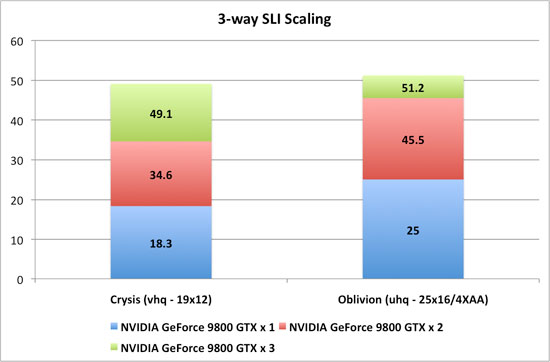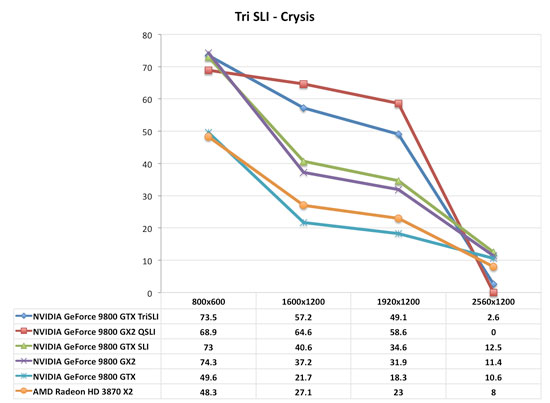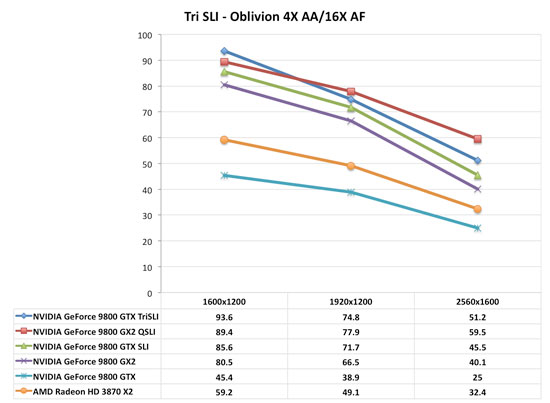GeForce 9800 GTX and 3-way SLI: May the nForce Be With You
by Derek Wilson on April 1, 2008 9:00 AM EST- Posted in
- GPUs
Scaling and Performance with 3-way SLI
As we’ve explained, we had a great number of issues in testing 3-way SLI and Quad SLI on our 790i board. We couldn’t even get 8800 Ultra Tri SLI to work, as it draws so much power in addition to being finicky in the first place. We were able to get some numbers run on Crysis and Oblivion.
Here is a look at performance scaling with both; we’ll look at comparative performance further below.

These numbers were run on the 790i system and we absolutely did leave VSYNC on its default setting. Performance differences between one, two, and three 9800 GTX cards were more compressed when we force VSYNC off in the control panel.
Here is how Crysis stacks up in a direct comparison with the major competition (except for the 8800 Ultra configuration which we could not run).

9800 GTX 3-way is absolutely playable at 1920x1200 with Crysis when using Very High settings. Clearly Quad SLI leads the way here, but for $300 less, that’s not a bad deal if what you want to do is play Crysis at 1920x1200.

The delta between Tri and Quad is lower here. In both cases, two 9800 GTX cards outperform a single 9800 GX2. While the 9800 GX2 can be plugged into any system, NVIDIA still wants to sell 790i platforms. If you’ve got or want an NVIDIA based platform, you get higher performance for the exact same price by going with two 9800 GTX cards over a single 9800 GX2.
With the hassle of huge power supplies, cooling, etc. associated with Tri and Quad SLI, our money for maintaining value with a high end solution would have to fall to the 9800GTX SLI set up. 3-way seems to have some problems at the moment as well, as we ran into one large issue in one of the only two games we tested. Oblivion has some graphical issues that we document here on YouTube.










49 Comments
View All Comments
crimsonson - Tuesday, April 1, 2008 - link
Although the graphs works well it is gets very difficult to read when there are a lot of test subjects. Can you guys find another way? Trying to trace a dozen lines and trying to make a distinction between them is rather hard and defeats the whole purpose of a visual AID. I end up reading the spreadsheet instead..02
Spacecomber - Wednesday, April 2, 2008 - link
These graphs are beginning to resemble the one's from AnandTech's heatsink reviews, which is not a good thing. Jamming as much information as you can into a single graph serves no purpose. They're unreadable. The reader is forced to use the table, instead, which means the graph has failed as an illustration.geogaddi - Tuesday, April 1, 2008 - link
seconded. and reading spreadsheets for me is like shooting pool with a piece of rope...
.04
jtleon - Tuesday, April 1, 2008 - link
I must second that sentiment. Isn't the objective of web content to clearly communicate a message and minimize confusion? There are many data communication tools available, one example is DaDISP (www.dadisp.com) which is extremely powerful and rather cost effective. I don't work for dadisp, only use it on a regular basis. The free evaluation version should satisfy your needs easily.Regards,
jtleon
7Enigma - Tuesday, April 1, 2008 - link
I'm really dissapointed to see the 8800GT not present in this review. As a person just getting ready to build a system I am on the fence with purchasing this new 9800GTX, or saving >$100 and going with the 8800GT until we actually get a next-gen part.Since the platforms/issues are around I cannot really compare these results to previous reviews. If you could please comment, or throw the 8800GT on for a couple quick gaming benchmarks I (we) would be greatly appreciative!
Spuke - Tuesday, April 1, 2008 - link
I was hoping I could finally see a comparison between the 8800GT 512MB and the 9600GT. All Anandtech has is a review of the 8800GT 256BM versus the 9600GT.7Enigma - Tuesday, April 1, 2008 - link
8800GT and 9600GT are directly compared here:http://www.xbitlabs.com/articles/video/display/gai...">http://www.xbitlabs.com/articles/video/...ainward-...
"As we have seen in the gaming tests, 64 execution units are enough for most of modern games. We’ve only seen a serious performance hit in comparison with the Nvidia GeForce 8800 GT 512MB in such games as Bioshock, Crysis, Unreal Tournament 3 and Company of Heroes: Opposing Fronts. In a few tests the GeForce 9600 GT was even faster than the more expensive and advanced GeForce 8800 GT 512MB due to the higher frequency of the core. "
So basically its a good stop-gap solution for right now, but I would probably go with the 8800GT while waiting for the next gen cards (even at typical 19" LCD resolutions). If ATI/AMD was competetive currently I think the 9600GT would be the perfect card, but we have no idea how long Nvidia will milk their crown, and in turn how long before that next gen card actually takes to come out.
bill3 - Tuesday, April 1, 2008 - link
So you're saying Nvidia doesn't like more profits? And they like to help AMD?Because that's what not bringing out a next gen card does.
Is Intel going to delay Penyrns successor now to milk their lead also?
Nvidia doesn't have any other card ready, period. Because they are too slow, period.
7Enigma - Wednesday, April 2, 2008 - link
Lol Bill, you need to learn something about business. If you have the lead virtually across the board, any system builder but far more importantly OEM's will purchase your card if the price is right (ie AMD/ATI not undercutting for the sake of survival as they are with their Phenom cpu's). It doesn't matter if the top of the line is 2X as fast as the competition or 5X as fast, it will be purchased because it, for the time being, is the best. The same follows for the lower-grade cards. There is no reason to bring out the next-gen card killer until the competition brings something to the table that is actually competetive (or gasp...better). And funny you mention Intel because I believe they are doing EXACTLY that with their new quad's that aren't the very top of the line. These long delays and extremely limited availability seems to smack of milking for all its worth.That's good business I can't fault them for doing it. Sucks for us, but smart for them.
Jovec - Tuesday, April 1, 2008 - link
Yes, AT should pick 2-3 of the most common cards (how many of us are still running 8800GTS cards?) and include numbers as a baseline. Or have a low-mid and mid/high system that all cards get tested on for easy comparison in ongoing graphs. The question most of have is "I have card X, if I buy card Y how much of an improvement will it be and is it worth the cost?"